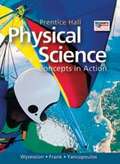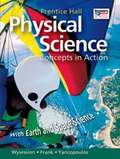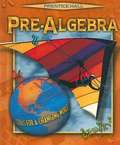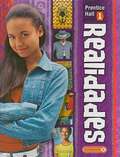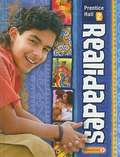- Table View
- List View
Prentice Hall Mathematics: Texas Geometry
by Randall I. Charles Basia Hall Dan Kennedy Art Johnson Laurie E. BassThis text will help you learn all of the Geometry Texas Essential Knowledge and Skills (TEKS). In addition, you will have ample opportunity to practice the Grade 8 and Algebra I student expectations required for the Grade 10 Texas Assessment of Knowledge and Skills (TAKS). Your textbook helps you get ready for TAKS every day in every lesson.
Prentice Hall Mathematics: Tools for Success, Middle Grades, Course 2
by Mark Illingworth Marsha S. Landau Leah Mccracken Suzanne H. Chapin Joanna O. MasingilaMath textbook for middle school students.
Prentice Hall Medieval and Early Modern Times (California Edition)
by Diane HartThis book on Medieval and Early Modern Times contains topics on Rome and Byzantium, Islamic Civilization, Civilizations in Sub-Saharan Africa, Civilizations in the Americas, Civilizations in East Asia, Europe in the Middle Ages and Early Modern Europe.
Prentice Hall Middle Grades Math: Tools for Success (Course 1 #3)
by Mark Illingworth Leah Mccracken Suzanne H. Chapin Marsha Landau Joanna O. MasingilaThe authors and consulting authors on Prentice Hall Math: Tools for Success team worked with Prentice Hall to develop an instructional approach that addresses the needs of middle grades students with a variety of ability levels and learning styles. Authors also prepared manuscripts for strands across three levels of Middle Grades Math. Consulting authors worked alongside authors throughout program planning and all stages of manuscript development offering advice and suggestions for improving the program.
Prentice Hall Middle Grades Math: Tools for Success, Course 1
by Mark Illingworth Marsha S. Landau Leah Mccracken Suzanne H. Chapin Joanna O. MasingilaThis first course book contains plenty of math tools for the success of middle grades.
Prentice Hall Physical Science Concepts in Action
by Michael Wysession David Frank Sophia YancopoulosNIMAC-sourced textbook
Prentice Hall Physical Science Concepts in Action
by Prentice HallThe academic standards for physical science outline the scientific inquiry skills and core content for all physical science classes in South Carolina schools. Each standard specifies a particular range of science topics. Following each standard is a set of indicators that state the thought processes, content knowledge, and skills that students must demonstrate in order to meet the standard. Your physical science course is designed to provide you with a conceptual understanding of the world around you. The Science Academic Standards provide a basic structure for your physical science course by specifying important content areas and process skills. The knowledge gained from your physical science course will serve as the foundation for your other high school science courses. At the end of your physical science course, you will take the state-required end-of- course examination. The end-of-course examination tests your knowledge of the academic standards for physical science. Using this book will help you master the physical science standards in preparation for the end-of-course examination.
Prentice Hall Physical Science Concepts in Action, with Earth and Space Science
by Michael Wysession David Frank Sophia YancopoulosNIMAC-sourced textbook
Prentice Hall Physical Science: Concepts in Action
by Michael Wysession David Frank Sophia YancopoulosNIMAC-sourced textbook
Prentice Hall Physical Science: Concepts in Action
by Michael Wysession David Frank Sophia YancopoulosPrentice Hall Physical Science: Concepts in Action enables students connect to the science they experience everyday and the one they are taught in class.
Prentice Hall Physical Science: Concepts in Action, Georgia
by Michael Wysession David Frank Sophia YancopoulosNIMAC-sourced textbook
Prentice Hall Physical Science: Concepts in Action, Tennessee
by Michael Wysession David Frank Sophia YancopoulosNIMAC-sourced textbook
Prentice Hall Physical Science: Concepts in Action, With Earth and Space Science, Oregon
by Michael Wysession David Frank Sophia YancopoulosNIMAC-sourced textbook
Prentice Hall Pre-Algebra, Oklahoma
by Randall I. Charles Bonnie Mcnemar Alma RamirezNIMAC-sourced textbook
Prentice Hall Pre-Algebra: Tools for a Changing World
by Prentice HallAs you work through this book, you'll find plenty of opportunities to improve your problem solving and reasoning skills. Some of the problems you'll work through are simple and routine, so you can practice and develop your skills. Other problems are more complex and require more time and thought to complete. No matter what, you'll find plenty of opportunities to use your skills in everyday life as well as in theoretical situations.
Prentice Hall Realidades 1 Practice Workbook
by Peggy Palo Boyles Myriam Met Richard S. Sayers Carol Eubanks WarginSpanish-English workbook
Prentice Hall Realidades, 1
by Peggy Palo Boyles Myriam Met Richard S. Sayers Carol Eubanks WarginNIMAC-sourced textbook
Prentice Hall Realidades, 1
by Peggy Palo Boyles Myriam Met Richard S. SayersNIMAC-sourced textbook
Prentice Hall Realidades, 1
by Peggy Palo Boyles Myriam Met Richard S. SayersNIMAC-sourced textbook
Prentice Hall Realidades, 1
by Peggy Palo Boyles Myriam Met Richard S. SayersNIMAC-sourced textbook
Prentice Hall Realidades, 1 (Texas Edition)
by Peggy Palo Boyles Myriam Met Richard S. Sayers Carol Eubanks Wargin Victoria M. Contreras Bárbara González PinoAn English/Spanish learning textbook.
Prentice Hall Realidades, 2
by Peggy Palo Boyles Myriam Met Richard S. Sayers Carol Eubanks WarginNIMAC-sourced textbook
Prentice Hall Realidades, 2
by Peggy Palo Boyles Myriam Met Richard S. SayersNIMAC-sourced textbook
Prentice Hall Realidades, 2 (Texas Edition)
by Peggy Palo Boyles Myriam Met Richard S. Sayers Carol Eubanks Wargin Victoria M. Contreras Bárbara González PinoSpanish learning text book.
Prentice Hall Realidades, 3
by Peggy Palo Boyles Myriam Met Richard S. SayersNIMAC-sourced textbook

